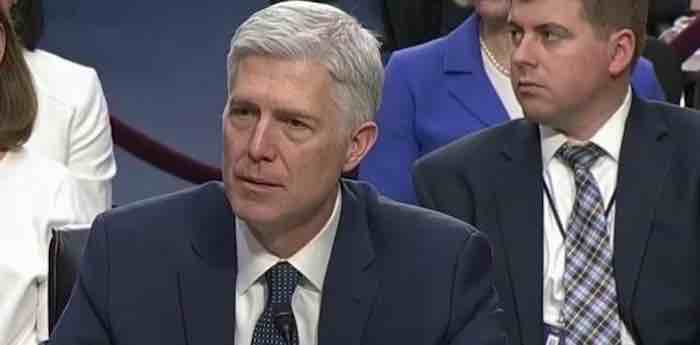By Dan Calabrese ——Bio and Archives--February 27, 2018
American Politics, News | CFP Comments | Reader Friendly | Subscribe | Email Us
 Current law, established more than 40 years ago, says unions can compel workers to pay them "agency fees" even if the workers choose not to join the unions, because the workers still benefit from unions' work collectively bargaining for wages, pensions, etc. That law almost went down two years ago, but Antonin Scalia's death resulted in a 4-4 tie vote.
Now comes the case known as Janus v. AFSCME, which considers the exact same question, and the presumption most people are making is that Justice Neil Gorsuch will provide the fifth vote for workers' rights to keep their money, just as Scalia would have. That may indeed be the case, but during yesterday's oral arguments, Gorsuch played it very close to the vest:
Current law, established more than 40 years ago, says unions can compel workers to pay them "agency fees" even if the workers choose not to join the unions, because the workers still benefit from unions' work collectively bargaining for wages, pensions, etc. That law almost went down two years ago, but Antonin Scalia's death resulted in a 4-4 tie vote.
Now comes the case known as Janus v. AFSCME, which considers the exact same question, and the presumption most people are making is that Justice Neil Gorsuch will provide the fifth vote for workers' rights to keep their money, just as Scalia would have. That may indeed be the case, but during yesterday's oral arguments, Gorsuch played it very close to the vest:After roughly an hour of sometimes testy debate in the courtroom, the outcome almost certainly hinges on the vote of the court’s newest justice, Neil Gorsuch – who did not tip his hand, opting instead to remain silent. The dispute before the Supreme Court today stems from the $45 that is deducted from Janus’ paycheck each month to go to the local branch of the union that represents him. Over 40 years ago, in a case called Abood v. Detroit Board of Education, the Supreme Court ruled that although it would violate the First Amendment to charge nonmembers for political activity such as lobbying, nonmembers can be required to pay fees, sometimes called “fair share” or “agency” fees, that cover the union’s costs to negotiate a contract that applies to all public employees. But Janus has urged the court to overrule its decision in Abood. He contends that even these more limited fees violate the First Amendment, because the issues commonly at the heart of contract negotiations for government employees – such as salaries, pensions and benefits for government employees – are inherently political. Therefore, he says, forcing him to pay an agency fee is no different from requiring him to pay to support a group that lobbies the government. The justices first agreed to take on the question presented by Janus’ case in 2013, in another case out of Illinois. But they declined to decide the issue then, on the ground that the plaintiffs in that case were not actually public employees. However, five justices – Justice Samuel Alito, joined by Chief Justice John Roberts and Justices Antonin Scalia, Anthony Kennedy and Clarence Thomas – suggested that they might be willing to reconsider Abood. Two years later, a group of California public-school teachers brought their challenge to agency fees to the court, but the justices had not yet ruled on their case when Scalia died in February 2016. Six weeks later, the court revealed that it was deadlocked, which once again left the lower court’s ruling in favor of the union (as well as Abood) in place. Perhaps sensing that they could have a hard time picking up a fifth vote on the substance of the question before the court, the more liberal justices focused today on what they seemed to see as the ripple effects from a ruling for Janus. For example, Justice Ruth Bader Ginsburg told attorney William Messenger – who argued on Janus’ behalf – that a decision abolishing the agency fees would take away resources from public-sector unions, resulting in less efficient collective bargaining. The opponents of the fees wouldn’t be the only ones to stop paying them if they weren’t mandatory, she suggested; even some union supporters might stop paying them as well, simply to save money.
View Comments
Dan Calabrese’s column is distributed by HermanCain.com, which can be found at HermanCain
Follow all of Dan’s work, including his series of Christian spiritual warfare novels, by liking his page on Facebook.